
What Is Turmeric (Curcuma Longa)?
Commonly found in Asian dishes, turmeric has been part of culinary life for many years. However, did you know that it also experiences widespread use as a wellness supplement? Arguably, turmeric is more popular today than it has ever been. Read on to discover everything you need to know.
Scouring the spices in your pantry, you're more than likely to come across a jar of turmeric powder. While it has plenty of applications in cooking, you might be surprised to learn that turmeric is highly revered in the world of wellness supplements. With that in mind, allow us to take you through everything you need to know about turmeric.
What exactly is turmeric?
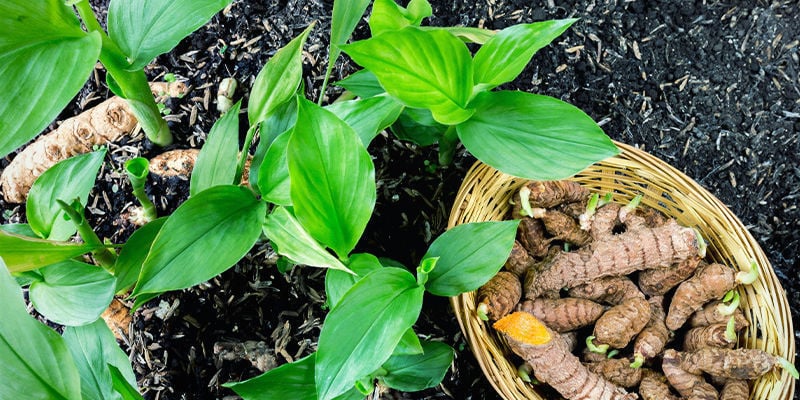
As part of the ginger family, turmeric, otherwise known as Curcuma longa, is a plant native to India and Southeast Asia. The plant produces rhizomes (roots) that are harvested and most often used in cooking.
The rhizomes are traditionally dried and ground into turmeric powder—characterised by its yellow/orange appearance, and often used in Asian dishes to impart vibrant colour and a flavour reminiscent of black pepper. Turmeric is undoubtedly a versatile spice that still experiences fairly widespread use in the modern world.
It also makes for a great addition to supplements, as turmeric exhibits a host of potential effects. But we'll get into those shortly.
Where turmeric comes from
As mentioned, turmeric is native to India and Southeast Asia, and is steeped in history, with links to Hinduism and Buddhism. In fact, powdered turmeric was even used to dye the robes of priests and monks.
Turmeric vs curcumin
When reading about turmeric, you’ll often see curcumin mentioned in the same line. This is for good reason. While turmeric is the spice made of the roots of Curcuma longa, curcumin is the main active compound of interest—also known as a “curcuminoid”—within turmeric.
Curcumin is known to affect levels of antioxidants in the body and displays a host of other intriguing effects. Therefore, if purchasing turmeric supplements, you’ll often see the concentration of curcumin by volume.
What is turmeric good for?
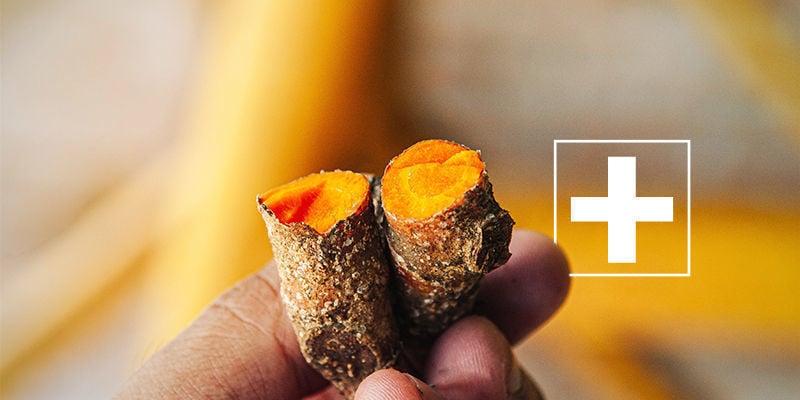
We’ve touched upon the fact that turmeric displays several potential benefits, but what exactly is it good for? And why is it so highly sought after as a key ingredient in supplements?
You might be surprised to learn that turmeric has some pretty significant links to the immune system, heart health, and even brain function. Allow us to break it down for you.
Turmeric and the immune system
Various scientific studies have assessed curcumin for its antioxidant and anti-inflammatory potential. In such studies, it has demonstrated an ability to influence the immune system by impacting B & T cells and natural killer cells. These cells regulate antibodies in the human body and eliminate invading pathogens. A 2007 trial shows that, when given in low doses, turmeric may enhance antibody responses (Jagetia & Aggarwal).
While studies into turmeric’s pharmacological effects are in their infancy, the results so far indicate a beneficial relationship between the spice and the immune system.
Turmeric and heart health
Turmeric has also made waves in the world of heart health. Through its potential to impact the immune system and oxidation, a preliminary study identifies a possible mechanism by which turmeric could impact heart health (Sharifi-Rad et al., 2020).
Furthermore, a clinical trial from 2017 monitored the effects of curcumin in middle-aged adults over 12 weeks, finding the compound to potentially increase resistance artery endothelial function (Jiang et al.).
In another study, a group of 121 patients who had recently undergone coronary bypass surgery were given 4 grams of turmeric a day to assess the cardioprotective potential of curcuminoids (Wongcharoen et al., 2012). Although more conclusive clinical research is needed to understand turmeric's full scope of effects on heart health, the current research is undoubtedly a step in the right direction.
Turmeric and brain function
Turmeric's impact on brain function is also one being watched closely by medical and scientific professionals. A study carried out over an 18-month period administered patients 90mg of curcumin twice daily (Small et al., 2018). The results showed markers associated with improved memory and better cognitive performance in most subjects.
Of course, it goes without saying that the brain is a hugely complex organ, but there is early research examining curcumin’s potential to delay or even reverse the symptoms of Alzheimer's disease (Dong et al., 2012). Curcumin has been shown to increase the production of a protein found in the brain and spinal column. Known as brain-derived neurotrophic factor, or BDNF, it has the power to maintain nerve cells and ensure communication—a process paramount for learning and memory.
Different forms of turmeric
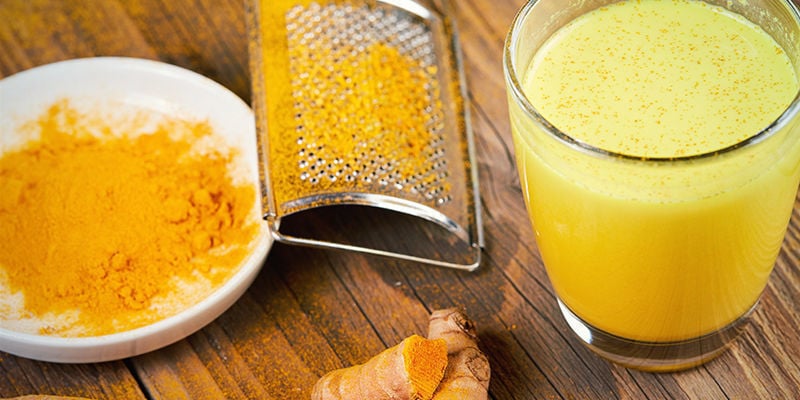
When it comes to consuming turmeric, there are many forms to choose from. Of course, you can grab the spice jar from your cupboard and add a little turmeric powder to your favourite dishes. Some even sprinkle turmeric in their morning coffee or tea for a peppery hit of antioxidants.
However, for those seeking a more concentrated dose of curcumin, there’s a whole range of turmeric supplements and extracts available, some claiming to contain up to 98% curcuminoids. Turmeric supplements can be taken in capsule form or incorporated into various liquids.
Another method of consuming turmeric is a hot drink known as “golden milk”. This warm beverage is usually made from coconut milk, sweeteners, and a hearty amount of turmeric. The result is an immune-boosting drink with a surprisingly enjoyable taste.
Are turmeric supplements safe?
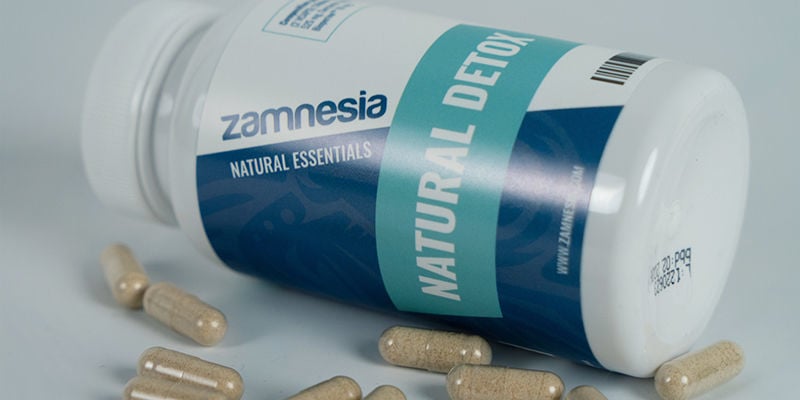
As noted in the studies above, turmeric and curcumin display a good safety profile and are generally well-tolerated. And, as high-quality supplements contain a predesignated amount of turmeric, it's highly unlikely that a user would take too much. However, there are some mild side effects associated with taking turmeric, such as stomach upset and headaches, that may affect a minority of people. Furthermore, those taking blood-thinning medication should consult with their doctor before taking turmeric supplements.
But generally, turmeric supplements are safe and easy to use, making them an ideal way to sample everything this legendary spice has to offer. So if you've ever wondered what turmeric can do for you, there's never been a better time to see for yourself!
- Gary W. Small, Prabha Siddarth, Zhaoping Li, Karen J. Miller, Linda Ercoli, Natacha D. Emerson, Jacqueline Martinez, Koon-Pong Wong, Jie Liu, David A. Merrill, Stephen T. Chen, Susanne M. Henning, Nagichettiar Satyamurthy, Sung-Cheng Huang, David Heber, & Jo. (2018/03/01). Memory and Brain Amyloid and Tau Effects of a Bioavailable Form of Curcumin in Non-Demented Adults: A Double-Blind, Placebo-Controlled 18-Month Trial - https://www.ajgponline.org
- Jagetia, Ganesh Chandra, Aggarwal, & Bharat B. (2007, January). “Spicing Up” of the Immune System by Curcumin - https://link.springer.com
- Jiang, S., Han, J., Li, T., Xin, Z., Ma, Z., Di, W., Hu, W., Gong, B., Di, S., Wang, D., & Yang, Y. (2017/05/01). Curcumin as a potential protective compound against cardiac diseases - https://www.sciencedirect.com
- Sharifi-Rad, Javad, Rayess, Youssef El, Rizk, Alain Abi, Sadaka, Carmen, Zgheib, Raviella, Zam, Wissam, Sestito, Simona, Rapposelli, Simona, Neffe-Skocińska, Katarzyna, Zielińska, Dorota, Salehi, Bahare, Setzer, William N., Dosoky, Noura S., Taheri, & Yasama. (2020/09/15). Turmeric and Its Major Compound Curcumin on Health: Bioactive Effects and Safety Profiles for Food, Pharmaceutical, Biotechnological and Medicinal Applications - https://www.frontiersin.org
- Suzhen Dong, Qingwen Zeng, E. Siobhan Mitchell, Jin Xiu, Yale Duan, Chunxia Li, Jyoti K. Tiwari, Yinghe Hu, Xiaohua Cao, & Zheng Zhao. (Feb 16, 2012). Curcumin Enhances Neurogenesis and Cognition in Aged Rats: Implications for Transcriptional Interactions Related to Growth and Synaptic Plasticity - https://journals.plos.org
- Wanwarang Wongcharoen, Sasivimon Jai-aue, Arintaya Phrommintikul, Weerachai Nawarawong, Surin Woragidpoonpol, Thitipong Tepsuwan, Apichard Sukonthasarn, Nattayaporn Apaijai, & Nipon Chattipakorn. (2012/07/01). Effects of Curcuminoids on Frequency of Acute Myocardial Infarction After Coronary Artery Bypass Grafting - https://www.ajconline.org
-
 5 min
February 21, 2023
Everything You Need To Know About Guarana
Coffee is no longer the sovereign caffeine king. Though famed for its caffeine content and used by millions to wake up in the morning, there’s another berry that provides a more potent stimulating...
5 min
February 21, 2023
Everything You Need To Know About Guarana
Coffee is no longer the sovereign caffeine king. Though famed for its caffeine content and used by millions to wake up in the morning, there’s another berry that provides a more potent stimulating...
-
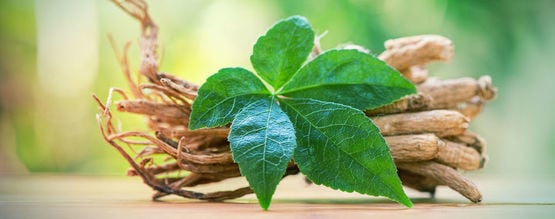 4 min
October 27, 2022
Getting To Know Ginseng
A staple of traditional Chinese medicine, ginseng still has a valued place in the modern world. Thanks to a variety of consumption methods and a host of possible wellness benefits, it's never been...
4 min
October 27, 2022
Getting To Know Ginseng
A staple of traditional Chinese medicine, ginseng still has a valued place in the modern world. Thanks to a variety of consumption methods and a host of possible wellness benefits, it's never been...
-
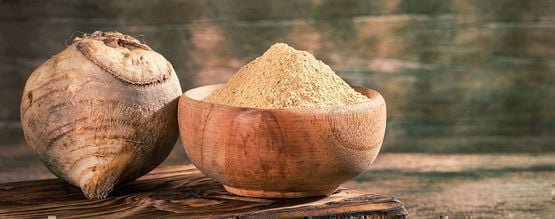 4 min
September 29, 2022
Everything You Need To Know About Maca Root
Heard about maca's unique potential to improve sex drive, energy level, and cognitive function? In this article, we take an in-depth look at Peruvian maca root, its rich cultural history, potential...
4 min
September 29, 2022
Everything You Need To Know About Maca Root
Heard about maca's unique potential to improve sex drive, energy level, and cognitive function? In this article, we take an in-depth look at Peruvian maca root, its rich cultural history, potential...
-
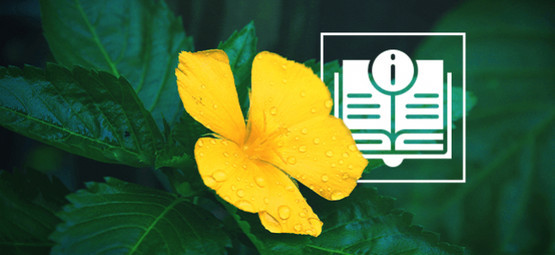 2 min
February 15, 2019
Damiana: Everything You Need To Know
2 min
February 15, 2019
Damiana: Everything You Need To Know











 United States
United States








